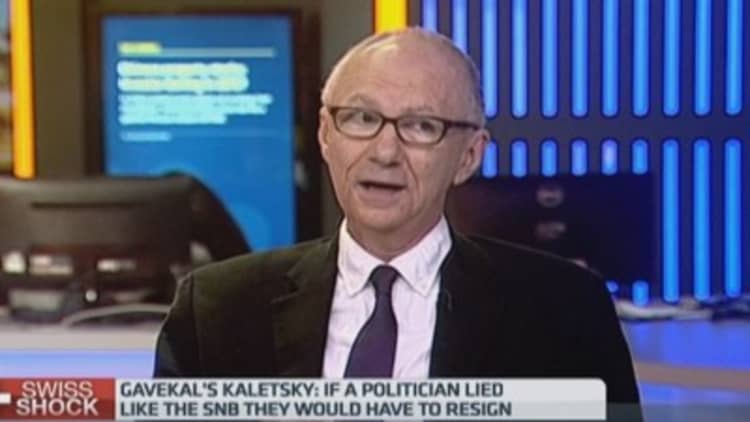The Swiss National Bank (SNB) had little choice but to abandon its three-year-old cap on the franc but its execution of the move left a vacuum of policy uncertainty where a pillar of stability stood before.
With the euro diving against the dollar as the European Central Bank gears up for fresh stimulus as early as next week, the SNB felt the 1.20-francs-per-euro cap was not sustainable and chose to give it up rather than accumulate further risk.
Yet in pulling off the move, the SNB - a conservative institution in a safe-haven state - failed to tip off its peers and shocked investors, who were left wondering whether central banks are now less a source of stability and more one of a risk.
Read MoreForexleverage: How it works, why it's dangerous
"The bottom line: central banks are a lot less predictable than in the past few years," said Christian Gattiker, chief strategist at Swiss bank Julius Baer.
The SNB, whose three board members make their decisions behind closed doors, acted in isolation.
IMF Managing Director Christine Lagarde lamented the lack of a warning from SNB Chairman Thomas Jordan. "I find it a bit surprising that he did not contact me," she said. For ECB policymaker Ewald Nowotny, the move was "a surprising decision".
In contrast with the ECB, which has 25 policymakers from across the continent who debate major decisions, just three men call the shots at the SNB, albeit in consultation with staff advisers.
Details of ECB policy debates often leak because of the large numbers of officials also involved; if President Mario Draghi announces next week that the ECB is to launch quantitative easing, he will surprise no one. Draghi has made no secret of the fact that such a programme is under discussion on the ECB Governing Council.
By contrast, as recently as Monday, SNB vice-chairman Jean-Pierre Danthine said the cap, introduced in 2011 at the height of the euro zone crisis to fend off deflation and a recession, would remain the cornerstone of SNB policy.
To spring such a U-turn seems at odds with Jordan's own advice. In a 2007 speech, he said: "A transparent monetary policy occasionally does not completely rule out surprises, provided that they occur relatively seldom and are understandable to the public."
Read MoreSwiss shock: Leucadia bails out FXCM after losses
While officials at central banks generally play down the idea that they offer each other advance notice, they almost always prepare financial markets, businesses and each other for important policy shifts by openly discussing their thinking in the run up to any move.
But Adam Posen, a former Bank of England official who heads the Peterson Institute for Economics in Washington, said transparency at times needed to be sacrificed.
"Central bank communication is overrated," Posen said at an event in Washington when asked about the SNB's move. It's more important to get a policy right than to stick to a "foolish consistency" of communicating everything, he said.
For exporters and the tourism industry in Switzerland, the move that has led to a near 18 percent rise in the franc against the euro is far from understandable. Christian Levrat, president of the left-wing Social Democrat party, called the move "a serious threat for tens of thousands of Swiss jobs".
'Incomprehensible'
The Swiss Textile Association, whose members export 75 percent of their goods to the European Union, described the move as "incomprehensible" given the SNB's affirmation of the cap in December.
"All depends on where the exchange rate settles. If it stays around parity (with the euro), it's going to be a real blow for the Swiss economy," said Jan-Egbert Sturm, director of the KOF Swiss Economic Institute.
The KOF's models point to Swiss economic growth of less than one percent this year if the exchange rate moves to 1.10 euros to the franc, he said.
However, it is hard to imagine how the SNB could have hinted that it was considering ending the cap without inviting foreign exchange dealers to bet on such a move, causing the same market turmoil that struck anyway on Thursday after the announcement.
"If you decide to exit such a policy, you have to take the markets by surprise," Jordan said on Thursday.
Swiss Economy Minister Johann Schneider-Ammann was informed of the decision by Jordan about half an hour before the announcement, a spokesman for the minister's office said.
Domestic debate in Switzerland has revolved around the risks associated with having currency reserves that amount to roughly 80 percent of annual economic output.
Any losses on the SNB's assets - though book losses - could hurt or even halt its annual payout to its biggest shareholders, Switzerland's 26 cantons, or states, and to the federal government, as happened in 2013 when the bank reported a loss due to a fall in gold prices.
Strategy vacuum

The cap has formed the backbone of the SNB's strategy since its introduction in 2011 as a temporary measure. In reverting to interest rates as the main monetary policy tool, the bank did not really present a strong alternative strategy.
The SNB cut another 0.5 percentage points from the interest rate on some cash deposits held by commercial banks at the central bank on Thursday to -0.75 percent after pushing it into negative territory in December.
UBS strategist Geoffrey Yu said the interest rate move suggested that would be the SNB's main policy focus in the immediate future.
The opaque communication left investors questioning the credibility of the SNB, whose board members had previously stuck doggedly to their well-worn rhetoric on the cap.
"It was only about 48 hours ago when we had a speech from Mr Danthine on the SNB board where he again stated that the floor would remain in place," Yu said on a call with investors.
"This makes communication between the SNB and markets extremely difficult, especially when they do want to think about what the next stage of policy is going to be," he said.

